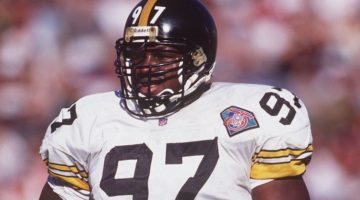Michael Sam could’ve taken the — well, not the easy, but certainly the easier — way out by staying mum on his sexual orientation, at least until after the NFL draft.
Instead, one of the nation’s top college football players bravely decided to speak now, to tell the world he is gay at a time when NFL teams are grading the guys they’ll be picking in a couple of months.
This is not Jason Collins, as courageous as he was, coming out at the end of his NBA career. This is a young man just getting started as a professional, after leading Missouri to one of the best seasons in school history.
Finally, we’ll get to see how this plays out, an openly gay player lining up in America’s most popular sport. Finally, we’ll get to see what barriers we’ve broken down and, more important, what hurdles remain when someone acknowledges he is gay, then competes with and against guys who may be repelled by the notion of having a relationship with another man. Because of Sam, it will be easier for the next guy. And the guy after that. But, for all the progress this country has made in gay rights, there will surely be plenty of ugliness in the weeks and months and years to come.
We’ve already gotten more than a glimpse at what Sam will face. At last year’s Super Bowl, San Francisco cornerback Chris Culliver made a fool of himself when jokingly asked by comedian Artie Lange if he would ever pursue a gay man.
“Ain’t got no gay people on the team,” Culliver said. “They gotta get up outta here if they do. Can’t be with that sweet stuff.”
A few years ago, I broached the idea of having an openly gay teammate to several players in the Atlanta Braves clubhouse. One freely conceded he would be uncomfortable dressing or showering in front of someone he knew is gay and I’ve long suspected he was not alone in that attitude. Anyone who has ever been in a sports locker room knows what a macho world that can be, where distasteful – even hurtful – words are thrown around with shocking frequency.
Just ask Jonathan Martin, the offensive lineman who walked away from the Miami Dolphins this past season, claiming he had been bullied and harassed daily by teammate Richie Incognito and others.
Eight NFL executives and coaches, interviewed by SI.com and given anonymity so they could give their true opinions, revealed the daunting challenges that Sam set himself up for by coming out ahead of the draft. Before he spoke, the Southeastern Conference defensive player of the year was projected as a mid- to late-round draft pick. Now, according to everyone interviewed by SI.com, his stock will certainly plummet.
“I just know with this going on this is going to drop him down,” said a veteran NFL scout. “Do you want to be the team to ‘break that barrier?’”
A player’s personnel assistant added, “I don’t think football is ready for it just yet. In the coming decade or two, it’s going to be acceptable but at this point in time it’s still a man’s-man game. To call somebody a (gay slur) is still so commonplace.”
Imagine what Sam might face on the field in a sport where it’s not all that unusual for a player to exact his own version of justice with a low blow or a dirty block. But there are some encouraging signs, as well.
Sam came out in August to his teammates and coaches at Missouri and it sure didn’t seem to have any negative impact on the Tigers. They went 12-2, won the SEC East Division title and defeated Oklahoma State in the Cotton Bowl. Sam, a 6-foot-2, 255-pound defensive end, led the conference in sacks (11.5) and tackles for loss (19).
“Michael is a great example of just how important it is to be respectful of others. He’s taught a lot of people here firsthand that it doesn’t matter what your background is, or your personal orientation, we’re all on the same team and we all support each other,” coach Gary Pinkel said. “If Michael doesn’t have the support of his teammates like he did this past year, I don’t think there’s any way he has the type of season he put together.”
Let’s hope there’s another team, another group of players that feels the same way, that judges Sam by what he can do on a football field. Nothing more. Nothing less. It’s time.
Paul Newberry is a national writer for The Associated Press. You may write to him at pnewberry@ap.org or www.twitter.com/pnewberry1963











No Comment